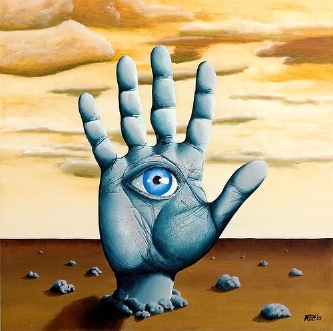The Eye is in the Hand of the Beholder
Part of a yearlong series on resilience in Jewish spiritual life.
If art and beauty are in the eye of the beholder, then what about spirituality and especially communal spirituality? And when we feel disconnected – as everyone sometimes does – then what? This week’s Torah portion (Re’eh) invites us to see that seeing our eye as our primary spiritual connector might be part of our problem. Among the most potent paths of spirituality is not our eyes but our hands.
At least three times each year – at Passover, Shavuot and Sukkot – our spiritual ancestors brought to the Temple in Jerusalem their offering gifts, mainly in the form of agricultural goods. That journey to Jerusalem and assembly there was a unique act of making community, coming together as a collective, and suffusing one’s individuality to serve the whole and the holy in their midst.
Of their presence before the Presence, Torah records that each would bring “one’s own gift according to the blessing that YHVH your God bestowed” on that person (Deut. 16:17). In economic terms it was a “progressive” amount (based on ability to pay), and a radically “democratic” calling (everyone paid something). That itself is a big deal: a healthy community enfolds everyone without exception everyone participates by giving what they can without exception; and those blessed with more offer more willingly. So far, so good.
In spiritual terms, Torah doubles down on this democratic calling with a curious phrase: ולא יראה את פני יהו׳׳ה ריקם (Deut. 16:16). How we translate this key phrase makes a tremendous difference to what we imagine spirituality (and democracy) to mean in communal terms. This phrase’s most common English rendering is, “And none will be seen before God’s face empty-handed” – in ancient parlance, just a repetition that everyone will bring something. But peel back the layers, and other meanings arise.
One profound meaning is this: “And none will see God’s face if they are empty-handed.” Take this in. In Torah’s understanding, nobody is empty-handed – everyone has a gift to bring “according to the blessing that YHVH your God bestowed” – so how can it be that anyone could be empty-handed?
We learn not that the journey to see God requires an admission ticket, but that anyone who feels empty-handed, without a genuine and valuable gift to bring, won’t be able to see and experience the holiness we call God. We learn that our capacity to see and experience holiness in our lives and in our world depends at least partly on what we give and what we feel ourselves capable to give. And by Torah’s own words, this isn’t an economic question but rather a spiritual question. The eye is in the hand of the beholder.
Torah doubles down on this teaching in a second way. Torah’s word for “empty-handed” (ריקם / reikam) really means “vainly” or “emptily,” meaning without effect. There’s no mention of a hand at all. Rather, when we feel ourselves to have no effect, to live vainly or emptily, that’s when we tend not to give. Our hands might as well be empty, and of course we won’t see.
What we most can bring is our fullest selves – and yes, that means our love, our patience, our time, our volunteerism, our charity, our compassion and everything else we can invest in building sacred community. Let these be the works of our hands, according to the blessings in our lives. The more we see our lives blessed, the more we’ll find ways to give, the fuller our hands will feel, the more we’ll give, and the more holiness we’ll see.
It’s a virtuous cycle, this cycle of virtue. The eye really is in the hand of the beholder. Let your own hands be your resilience teachers this week, and every week.
Rabbi David Evan Markus






 Evan J. Krame was ordained as a rabbi by the
Evan J. Krame was ordained as a rabbi by the